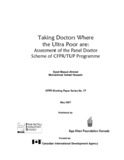| dc.description.abstract | To facilitate access of ultra-poor households to qualified allopathic care, especially for moderate-to-severe and chronic morbidities, the Challenging the Frontiers of Poverty Reduction/Targeting the Ultra Poor (CFPR/TUP) program appointed a panel of doctors in its Area Offices. This study was carried out to assess the current status of this ‘panel doctor’ scheme, identify its problems and prospects from a participatory perspective, and suggest remedial measures for future improvement. Two Upazilas from each of the 12 CFPR/TUP regions where the scheme is running for more than one year were included in the survey. Research activities included an inventory of physical facilities, participant observation of the services provided, and exit interviews of the patients coming for treatment in these 24 sites. In addition, in-depth interviews with 12 panel doctors and six focus group discussions with groups of health workers and the community people were done. Findings reveal that the scheme was received favourably by the ultra-poor and the beneficiaries were satisfied with the services of the panel doctors. However, some concerns were raised with respect to the responsiveness of the scheme as also financial restrictions imposed such as capping the costs of medicines and lab tests. These issues need some rethinking in order to improve the ability of the scheme to mitigate the income-erosion consequences of ill-health for ultra-poor households and contribute to their efforts at sustainable livelihood. | en_US |

